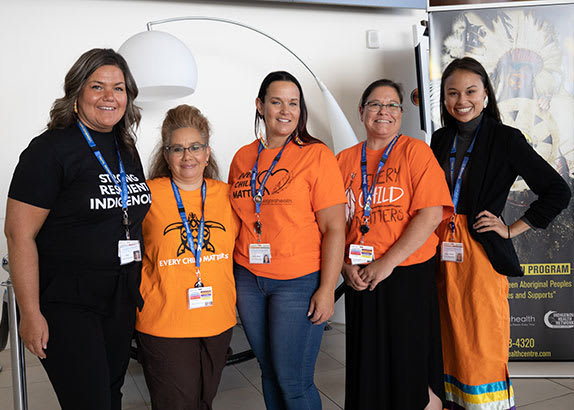While you're here
Share This Page
Share This Page
Learn about the tools and services available at Niagara Health to make your visit more comfortable.
Concern about a family member is natural. We support families and want their help in developing a patient's treatment plan.
It's helpful, where possible, to provide the name and relationship of one individual to serve as the primary contact or spokesperson for your family. Appointing a spokesperson has several benefits. With fewer people calling for patient updates, it reduces the number of phone calls to the unit. It also ensures all family members receive the same information.
If you have previously identified a ‘Substitute Decision Maker’ (SDM) than this would be the most appropriate person to list at the time of registration. This individual would make healthcare decisions for you if you were unable to make them yourself.
In the event that your healthcare team determines you are incapable of making certain personal care decisions, there is a specific order of SDMs or people (mostly relatives) who we are required to contact to make decisions on your behalf. Contacting your SDM for consent purposes is mandatory as part of the Health Care Consent Act. If you prefer to choose your SDM, you must appoint them through a Power of Attorney document.
Also note that identifying a ‘next of kin,’ ‘emergency contact’ or ‘person to notify’ when you come to the hospital may not be the person that can legally make decisions for you, which is why you are encouraged to appoint a SDM and list them at the time of registration.
To discuss this procedure and other concerns related to decision-making, please ask to speak with a social worker at Niagara Health.

The team strives to create a safe environment where Indigenous patients receive a holistic approach to health while they are receiving care at Niagara Health. This includes the following services:
If you have any questions or wish to speak to a team member from Indigenous Health Services and Reconciliation, please call 905-378-4647 x43211 or email IndigenousHealthServices@niagarahealth.on.ca
Niagara Health Spiritual Care staff are interprofessional team members who work with patients, families, staff and volunteers across Niagara Health. They can help you:
Spiritual and Religious Care staff also work with area faith communities/congregations in order for appointed visitors (‘ordained’ and ‘lay’) to attend to the spiritual needs of people in the hospital.
Palliative Care is a type of care for people who have a serious illness. It can be offered at any point from diagnosis to near the end-of-life, and may be in addition to the treatment a person is receiving for their illness.
This holistic approach to care focuses on improving quality of life and emotional wellbeing for patients and families.
The Niagara Health Palliative Care Consultation Service offers support with managing symptoms, providing social and emotional support, organizing home or hospice care, and providing end of life care.
This service is available to all Niagara Health patients. Please speak to your inpatient physician if you would like a referral to the Palliative Care Consultation Service.
Niagara Health is committed to people-centered care. Our Office of Patient Experience (formerly Patient Relations) fosters a healthcare environment where patient and family experiences are central to our care. We welcome patient and family feedback to drive continuous improvement focusing on compassion, respect, and person- and family-centered care.
We will partner with you, your family, caregivers, and people within the community to:
Contact Patient Experience by calling 905-378-4647 x44423 or emailing NHPatientExperience@niagarahealth.on.ca
Healthcare ethics is a thoughtful exploration of how to act well and make morally good choices, based on ethical principles and values.
Clinical practice is full of ethically challenging situations and decisions about medical treatments that involve moral principles, religious beliefs, or professional guidelines.
MAROTTA FAMILY HOSPITAL, NIAGARA FALLS & WELLAND HOSPITALS
In-room entertainment
Connect with HealthHub Solutions through an easy-to-use device for patient in-room entertainment, information and services at your bedside. Services include TV, video calling, Pluto TV and more. Ask your healthcare team for more information.
FORT ERIE & PORT COLBORNE COMPLEX AND URGENT CARE CENTRES
A telephone providing free local calling is located at most patient bedsides. Pay phones are also available throughout the hospital. Please ask a member of your healthcare team for information on television service in your room.
A guest wireless internet service is accessible to our patients, visitors and guests on a pay-for-use basis. This system, called iVisitor, is provided in partnership with Cogeco Cable Canada LP and is similar to guest internet services offered at other hospitals. iVisitor is available across Niagara Health, and revenue generated from the service is directed to patient care.
iVisitor rates are as follows:
Note: utilizing the iVisitor service assumes acceptance of the Acceptable Use Policy.
Patients are provided with three nutritious meals daily – breakfast, lunch and dinner. If you have nutritional concerns or special dietary needs, please ask a member of your healthcare team to arrange for a Dietitian to visit you. The hospital does not provide meals to visitors on patient units.
Interpreter services are available in many languages. Niagara Health also provides Video Remote Interpretation Services (VRI), which allows the user to see the person who is interpreting the information.
Please ask a member of your healthcare team if assistance is required.
At Niagara Health, we treat your personal health information with respect and sensitivity and do so in accordance with the Ontario Personal Health Information Protection Act (PHIPA, 2004) and all other applicable legislation.
Learn more